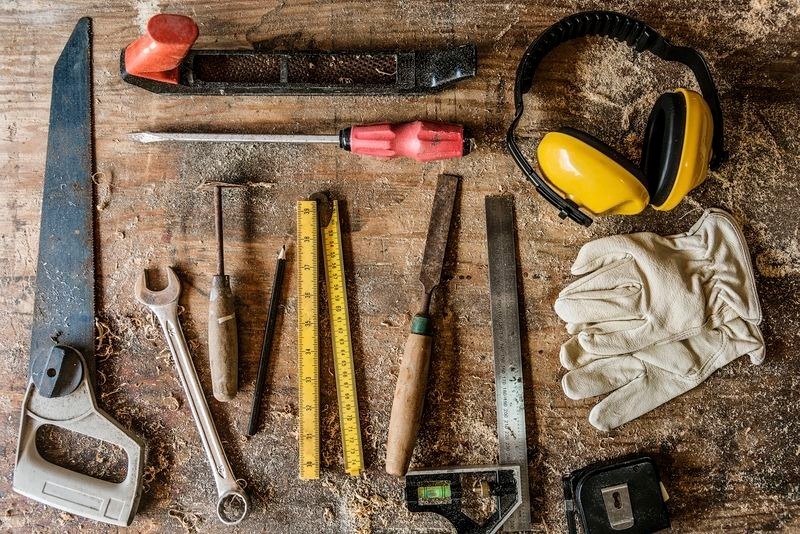The psychological community supports the use of art therapy as an experiential tool for healing. Art comes in many forms. Woodworking is an underappreciated method of art with many mental and social benefits for people with substance use disorders. Here are 5 benefits to woodworking that you may not have considered.
#1 Improving Concentration
Drugs cause rapid degeneration of cognitive functions. Depressants, opioids, and hallucinogenics all decrease concentration. Users often find themselves struggling to perform basic activities. Stimulants, sometimes thought of to be an exception to this rule, aren’t really an exception at all. People frequently abuse them to increase concentration. Long-term use causes the opposite effect. The brain becomes dependent on stimulants to concentrate; thus, it becomes difficult to do so sober.
The brain is a muscle you can retrain though. Woodworking can help build up concentration. When you’re working with saws, drills, and sanders, you must pay close attention to prevent accidents. Small miscalculations in measurements can set back a project. As you work on creating wood pieces, you’ll practice strengthening your attention span. Little things like marking your wood in the right place and placing a screw will allow you to exercise your mind. Your concentration will build back up little by little.
#2 Normalizing Brain Chemistry
In the height of addiction, your neurotransmitters don’t respond properly. Drugs and alcohol hijack the brain’s reward system. Substances flood the receptors with increased dopamine levels, then prevent the reuptake. The mind shuts down receptors in an attempt to balance the system. This creates a complication when going through recovery.
Hobbies like woodworking can assist in the brain’s production and reception of dopamine, serotonin, and endorphins. As you engage your muscles and mind in activities you enjoy, your brain will release healthy doses of these neurochemicals. They regulate mood and ease mental illness symptoms. Over time, as it recognizes the changes in neurotransmitters, your brain will reopen receptors. You’ll begin to feel joy at healthier levels.
#3 Enhancing Spacial Skills
When recovering from a substance use disorder, people encounter many stressful situations. This is an inevitable part of recovery. The emotions related to stress lead many people to relapse. It’s important to navigate problems logically instead of reactionarily. Logic is built on other skills like objectivity and spatial skills. Luckily, these elements can be taught during addiction treatment.
Woodworking is a way to improve spatial thinking. A 2014 study published in Empirical Research in Vocational Education and Training examined the relationship between spatial skills and carpentry. Researchers found that people who build objects with wood possess higher spatial reasoning than the general population. They also found that the application and understanding of spatial knowledge improve at statistically significant levels throughout the kinetic learning process.
Chapter 3 of Learning to Think Spatially by the National Research Council explains how prevalent these skills are. It states,
“Spatial thinking is so deeply embedded in the activities of daily life and thought that it is difficult to disentangle and appreciate its role. We may not even realize its role, but it is fundamental to many taken-for-granted activities, underpinning their successful performance and sometimes accounting for their spectacular failure.”
We aren’t always aware when we’re using spatial skills, but they’re important to functioning in recovery. Examples of spatial knowledge include creating a daily schedule with appointments and organizing your belongings in a sober living facility room.
#4 Activating the Whole Brain
Wooden objects may look simple; however, the creation process is intricate. Woodworking engages the brain system in a complex manner. It involves creativity, math, logic, memory, spatial reasoning, emotions, and hand-eye coordination. Every part of the brain operates while planning and executing your project. The positive neural pathways across the brain hemispheres strengthen. The negative neural pathways related to substance use disorder weaken as they fall into disuse. Whole-brain activities encourage neuroplasticity in a way that’s healing for people with addictions.
#5 Building Friendships
Prior to treatment, many people with substance use disorders only socially associate with others that use or drink. Re-entering those relationships after a residential treatment program can encourage relapses. It may be best for people serious about recovery to create distance or sever these ties entirely. Alternatively, they can lean into new friendships for support. They should build these connections through shared interests instead of substances.
People in recovery can meet new friends in woodshops. Often, everyone shares tools and workbenches. This promotes teamwork and coexistence. There’s an opportunity for socialization. The environment benefits people who struggle with social cues. The space has a built-in conversation topic. In this space, you can ask many questions:
- What are you making?
- Do you enjoy learning new techniques?
- How long have you been woodworking?
- What’s your favorite kind of wood?
- Can you help me with [insert difficult skill here]?
- What colors are you painting your project?
Outside of socializing in shared spaces, there are many woodworking and carpentry clubs across the globe. Online, many guilds offer video tutorials on different projects. There is a booming, passionate community of woodworkers for you to join.
Many people with mental illnesses dislike the clinical feeling of traditional therapy. If you want to heal from your substance use disorder, you might prefer a holistic option. Woodworking offers you psychological and social benefits while maintaining some semblance of normalcy. It feels more like learning a new hobby instead of dissecting your psyche. At Spero Recovery, our affordable 30- to 90-day substance use disorder programs encourage healing through experiential therapies. We offer a fully equipped woodshop with a wide range of power tools. You’ll work alongside others in our sober community. Peers can celebrate each others’ accomplishments. Alumni receive full access to our resources, so you can meet people who are succeeding in recovery. If you’re ready to join a community that builds each other up as we walk along our path to sobriety, reach out to Spero Recovery at (303) 351-7888.








